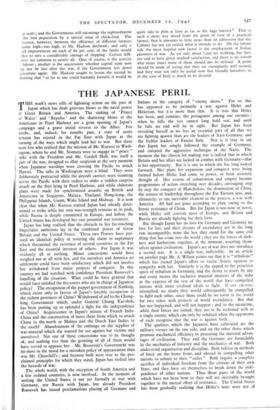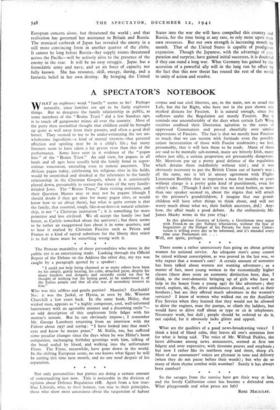THE JAPANESE PERIL
THIS week's news tells of lightning action on the part of Japan which has dealt grievous blows to the naval power of Great Britain and America. The sinking of ' Prince of Wales' and ' Repulse ' and the shattering blows at the Americans in Pearl Harbour are a grim opening of Japan's campaign and a grave initial reverse to the Allies. For weeks, and, indeed, for months past, a state of acute tension has existed in the Far East with Japan at the turning of the ways which might lead her to war. But there were few who realised that the mission of Mr. Kurusu to Wash- ington, where he and Mr. Nomura were to engage in " peace " talks with the President and Mr. Cordell Hull, was itself a part of the war, designed to allay suspicion at the very moment when Japanese warships were crossing the Pacific to attack Hawaii. The talks in Washington were a blind. They were deliberately protracted while the aircraft carriers were steaming across the Pacific with their orders to make a sudden surprise attack on the fleet lying in Pearl Harbour, and while elaborate plans were made for synchronised assaults on British and Americans in Singapore, Malaya, Thailand, Hong-kong, the Philippine Islands, Guam, Wake Island and Midway. It is now clear that when Mr. Kurusu started Japan had already deter- mined to strike while her own war-strength remains at its peak, while Russia is deeply committed in Europe, and before the United States has developed her vast potential war resources.
Japan has long realised that the obstacle to her far-reaching Imperialist ambitions lay in the combined power of Great Britain and the United States.* These two Powers have pur- sued an identical policy in resisting the claim to supremacy which threatened the existence of several countries in the Far East and the essential interests of others. For Japan it was evidently all or nothing. Minor concessions would have weighed not at all with her, and for ourselves and America no settlement could have been satisfactory which did not involve her withdrawal from major projects of conquest. In this country we had watched with confidence President Roosevelt's handling of the situation. What could he have granted that would have satisfied the fire-eaters who are in charge of Japanese policy? The recognition of the puppet government of Nanking, which exists only -in favour of Japan's forcible occupation of the richest provinces of China? Withdrawal of aid to the Chung- king Government which, under General Chiang Kai-shek, has been putting up so splendid a fight for the independence of China? Acquiescence in Japan's seizure of French Indo- China and the construction of bases there from which to attack China in the north or Malaya and the Dutch East Indies in the south? Abandonment of the embargo on the supplies of war-material which she wanted for use against her victims and ourselves? Not one of these concessions was to be thought of, and nothing less than the granting of all of them would have served to appease her. Mr. Roosevelt's Governmeht was no more in the mood for a mistaken policy of appeasement than was Mr. Churchill's ; and because both were true to the pro- claimed principles for which they stand, Japan has rushed into the hazards of war.
The whole world, with the exception of South America and a few isolated countries, is now involved. At the moment of writing the United States is not yet formally at war with Germany, nor Russia with Japan, but already President Roosevelt has issued proclamations placing all Germans and Italians in the category of " enemy aliens." For us this has appeared to be primarily a war against Hitler and Hitlerism, but it is more than that. It is true that Hitler has been, and remains, the protagonist among our enemies ; when he falls the rest cannot long hold out, and until he falls no end will be in sight. But Japan has been revealing herself as no less an essential part of all that we are fighting against than are the leaders of Nazi Germany, and the feebler leaders of Fascist Italy. Nor is it true to say that Japan has simply followed the example of Germany, and imitated the aggressive technique of the Nazis. The moment she has chosen for making war is indeed that in which Britain and her allies are locked in combat with Germany—that is her opportunity. But it is one to which she has long looked forward. Her plans for expansion and conquest were being formed before Hitler had come to power, or been seriously thought of. Her visions of colonisation and empire became programmes of action stretching over decades, envisaging step by step the conquest of Manchukuo, the domination of China, the seizure of leadership throughout the Far Eastern seas, and, ultimately, as one inevitable element in the process, a war with America. All had not gone according to plan, owing to the heroic resistance of China. But for Japan it was now or never, while Hitler still controls most of Europe, and Britain and Russia are already fighting for their lives.
But though Japan has no love for Germany and Germany no love for her, and their dreams of ascendancy are in the long run incompatible, none the less they stand for the same evil thing that has come into the world ; they are the forces of dark- ness and barbarism, together, at the moment, asserting them- selves against civilisation. Japan's act of war does not introduce a second war. It is a single war, indivisible. In an article on another page Mr. A. Wilson points out that it is " tribalism " which has ruined Japan's effort to excite Asiatic opinion to sympathy with her. Similarly it is the appeal to the primitive spirit of tribalism in Germany, and the desire to assert by any and every means the exclusive material interests of the tribe at the expense of the rest of the world that have compelled nations with more civilised ideals to fight. If our enemies triumphed, no doubt they would subsequently be compelled to fight each other, since there could be no room in the world for two tribes with projects of world ascendancy. But that has not happened, and will not happen ; and in the meantime, while their forces are joined, they are to be reckoned with as a single enemy, which can only be subdued when the opponents of each recognise that the war is against both.
The qualities which the Japanese have cultivated are the military virtues on the one side, and on the other those which promote mechanical efficiency in procuring the material advan- tages of civilisation. They and the Germans are formidable in the mechanics of industry and the mechanics of war. Both understand organisation and discipline. Both believe in methods of force on the home front, and abroad in compelling other nations to submit to their " order." Both require a complete sacrifice of individual freedom from the citizens of their own State, and they have set themselves to break down the inde- pendence of other nations. Thus those parts of the world which have not been bent to their will are inevitably brought together in the mutual effort of resistance. The United States has been gradually realising that Hitler's wars were not of European concern alone, but threatened the world ; and that realisation has governed her assistance to Britain and Russia. The maniacal outbreak of Japan has revealed the enemy in a still more convincing form in another quarter of the globe. It cannot be long before Russia—her supply routes threatened across the Pacific—will be actively alive to the presence of the enemy in the rear. It will be no easy struggle. Japan has a formidable army and navy, and an air force of capacity not fully known. She has resource, skill, energy, daring, and a fantastic belief in her own destiny. By bringing the United States into the war she will have compelled this country and Russia, for the time being at any rate, to rely more upon their own resources. But our own strength is increasing month by month. That of the United States is capable of prodigious expansion. Though the Japanese, with the advantage of pre- paration and surprise, have gained initial successes, it is doubtful if they can stand a long war. What Germany has gained by the accession of a powerful ally will in the long run be offset by the fact that this new threat has roused the rest of the world to unity of action and resolve.



























 Previous page
Previous page